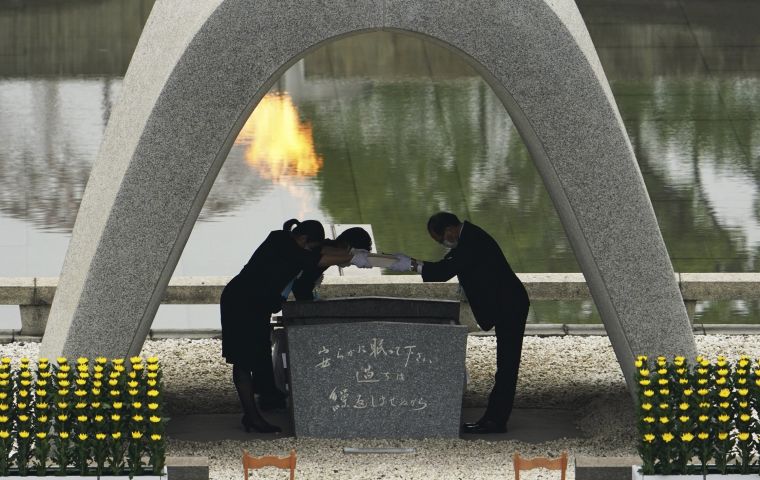MercoPress. South Atlantic News Agency
Hiroshima remembers the 75th anniversary of the first atomic bomb
 “On August 6, 1945, a single atomic bomb destroyed our city. Rumor at the time had it that ‘nothing will grow here for 75 years,’” said mayor Kazumi Matsui.
“On August 6, 1945, a single atomic bomb destroyed our city. Rumor at the time had it that ‘nothing will grow here for 75 years,’” said mayor Kazumi Matsui. Bells tolled in Hiroshima on Thursday for the 75th anniversary of the world’s first atomic bombing, with ceremonies downsized due to the novel coronavirus and the mayor urging nations to reject selfish nationalism and unite to fight all threats.
Though thousands usually pack the Peace Park in central Hiroshima to pray, sing and lay paper cranes as a symbol of peace, entrance was sharply limited and only survivors and their families could attend the memorial ceremony itself.
The city said that given the significance of the 75th anniversary of the bombing, that killed 140,000 people before the end of 1945, they had decided to hold the ceremony despite the spread of coronavirus, but with strict precautions in place.
“On August 6, 1945, a single atomic bomb destroyed our city. Rumor at the time had it that ‘nothing will grow here for 75 years,’” said mayor Kazumi Matsui.
“And yet, Hiroshima recovered, becoming a symbol of peace.”
At 8:15 a.m. on Aug 6, 1945, U.S. B-29 warplane Enola Gay dropped a bomb nicknamed “Little Boy” and obliterated the city, killing 140,000 of an estimated population of 350,000, with thousands more dying later of injuries and radiation-related illnesses.
On Thursday, at the exact time the bomb exploded, the crowd stood for a moment of silence in the heavy summer heat while cicadas shrilled and the Peace Bell rang.
“When the 1918 flu pandemic attacked a century ago, it took tens of millions of lives and terrorised the world because nations fighting World War I were unable to meet the threat together,” Matsui added.
“A subsequent upsurge in nationalism led to World War II and the atomic bombings. We must never allow this painful past to repeat itself. Civil society must reject self-centered nationalism and unite against all threats.”
Prime Minister Shinzo Abe attended as usual, but the number of foreign visitors was down. Overall attendance was scaled back to less than 10 percent of usual, with chairs spaced far apart and most attendees wearing masks.
The bombing of Hiroshima was followed by the bombing of Nagasaki on Aug. 9, instantly killing more than 75,000 people. Japan surrendered six days later, ending World War Two.




Top Comments
Disclaimer & comment rulesCommenting for this story is now closed.
If you have a Facebook account, become a fan and comment on our Facebook Page!